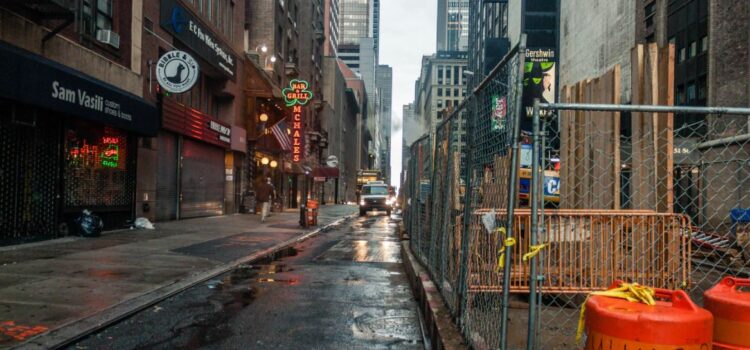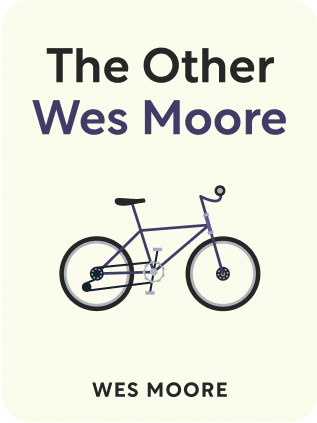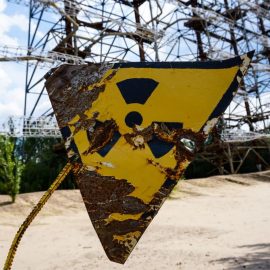

This article is an excerpt from the Shortform book guide to "The Other Wes Moore" by Wes Moore. Shortform has the world's best summaries and analyses of books you should be reading.
Like this article? Sign up for a free trial here .
What are the major themes in The Other Wes Moore? How do the themes relate to Wes Moore’s life?
Some of the themes in The Other Wes Moore surround fathers, mentors, poverty, and racism. The two Wes Moores share a multitude of struggles in their youths and they deal with them in different ways.
Read on to explore the major themes in The Other Wes Moore.
Themes in The Other Wes Moore
There are many important themes in The Other Wes Moore. This article is not meant to be a comprehensive list of all of the themes, but a collection of a few of the major themes and how they relate to Wes Moore’s life.
Fathers
On one of their first visits together, Moore and Wes discussed growing up without a father. Moore asked Wes whether he ever thought about how different his life could have been if his father had been around. To Moore’s surprise, Wes said he didn’t. When Moore questioned the truthfulness of this sentiment, Wes told him their situations were different.
Moore’s father had died when Moore was three years old, so he was gone through no fault of his own. Conversely, Wes’s father was gone because he wanted to be gone. Although the result was the same, the origins were different. Therefore, they were going to mourn their fathers differently.
Wes repeated a version of Moore’s question back to Moore, wondering about the impact losing his father had on Moore’s life. Moore didn’t know what to say. All he knew was that he missed his father every day. In that moment, Moore saw the difference between their stories. He was encouraged to always remember. Wes was encouraged to forget.
Mentors
Role models and mentors are reoccuring themes in The Other Wes Moore. Moore believes that young people need strong mentors in their lives. The tendency to focus only on what is right in front of them is strong in young people. What made the difference for him were all the people who steered him to look for more than that. They helped him see that being black and poor, not having a father, and living in underserved and crime-ridden communities didn’t dictate what kind of future he could have. They allowed him to understand what freedom meant.
However, Wes’s only role model was his elder brother, Tony. Tony did his best to keep Wes from falling into the gang life he was wrapped up in, but Wes never heeded Tony’s advice. He looked up to his brother and envied his independence and growing income. The more Tony pushed Wes away from a life of crime, the more Wes followed in his brother’s footsteps.
Both Moore and Wes hope that kids today will understand that this freedom exists. Moore believes it is the responsibility of all of us to make sure they do.
Poverty
Growing up, Moore did everything he could to hide how poor he was. He only had three outfits that were good enough for school, and he created a schedule by which to rotate them to hide the fact. At a certain point, he started borrowing some of his sister’s more gender-neutral clothing for variety. When the other kids talked about where they would “summer,” Moore tried to make up a vacation home in Brooklyn.
Moore also attended a rich, white school called Riverdale. Whenever he was on campus, seeing the beauty and opulence, he felt lost and guilty. He knew his mother struggled to keep his enrollment active, and he felt like an outsider among the privileged students. He suffered emotionally, feeling self-conscious. His grades began to diminish, and his personal standards for success plummeted.
Similarly, Wes was concerned with his image. He wore secondhand clothes and old shoes. He didn’t mind as much when he was in Dundee Village, but when he went back to his old neighborhood, he felt ashamed of his attire. His brother always had new gear and the latest fashion, as did others raking in the spoils of the drug enterprise. Wes was desperate for the same and it eventually led him to the world of drug dealing.
Racism and Inequality
Racism is one of the reoccurring themes in The Other Wes Moore. Moore stood out as one of a handful of black students at Riverdale. Whenever Moore was questioned about going to the white school, he’d try to change the subject. When that failed, he’d pretend the other students were intimidated by him.
It wasn’t until military school that Moore realized a black man could be successful. Captain Hill was a tall and muscular black man from Valley Forge Military Academy and Moore couldn’t help but be impressed by him. He had seen people in his neighborhood command respect because of their association with the gangsters, but he’d never seen anything like this. He now understood how different his new surroundings were to the Bronx. Respect wasn’t a product of fear or intimidation. It was earned through meritorious actions.
Later in life, Moore traveled to Langa, South Africa, where, despite the end of apartheid only half a decade earlier, economic inequality was severe between the black and white residents. Segregation was now a social construct, rather than a legal requirement.
Langa reminded Moore of Baltimore and the Bronx. He saw black people suffering and being more or less stuck without a clear path for change. The only difference was that poverty in the townships outdid anything Moore had seen in America.
Drug Abuse
Drugs appeared in both Wes Moores’ lives, but they affected Wes especially. By age ten, Wes’ brother Tony was already involved in drug deals. By 1984, at fourteen, he was a notorious gangster.
Tony didn’t want Wes to follow in his footsteps, but by middle school, Wes was already pulled in. He became be a lookout for drug dealers, but he rationalized that he wasn’t actually selling drugs or involved in the deal. He dismissed Tony’s warnings about the difficulty in escaping that life once you were in it. He didn’t think about all of the dangers that came with the game. He just wanted an easier way of life.
When he got older, Wes worked as a drug dealer for many years. Eventually, a girl he was seeing, Cheryl, became pregnant. Wes had tried to ignore Cheryl’s growing drug problem since before their children were born. But when he found her passed out and drooling from heroin one night, he knew he’d been wrong.
Wes couldn’t help but compare Cheryl to the other junkies who wandered the streets and sold anything and everything to score their drug of choice. It disturbed him to realize that he was responsible for keeping them that way. He left the house, heading anywhere that wasn’t home.
Wes was fed up with his way of life. He was sick of getting arrested, sick of contributing to the destruction of other’s lives, and sick of watching his community be destroyed.
Wes tried to go straight for a while, joined the job corps, and worked in construction. But when he realized that he had to work multiple jobs just to support his children and pay his bills, he went back to his old way of life.
There are some other themes in The Other Wes Moore, but these tend to be the ones that Moore focuses on the most.

———End of Preview———
Like what you just read? Read the rest of the world's best book summary and analysis of Wes Moore's "The Other Wes Moore" at Shortform .
Here's what you'll find in our full The Other Wes Moore summary :
- How two men from similar communities can have vastly different lives
- What led one Wes Moore to become a Rhodes Scholar
- What led the other Wes Moore to a life sentence






